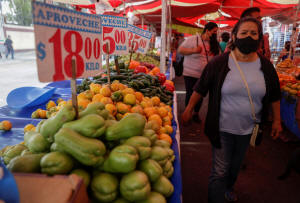Mexico taps private sector again in effort to keep food prices down
 Send a link to a friend
Send a link to a friend
 [October 03, 2022] By
Brendan O'Boyle, Anthony Esposito and Valentine Hilaire [October 03, 2022] By
Brendan O'Boyle, Anthony Esposito and Valentine Hilaire
MEXICO CITY (Reuters) - Mexican President
Andres Manuel Lopez Obrador is expected to announce the details of a new
deal with companies to halt rising food prices, doubling down on a
collaborative effort with the private sector as inflation hovers at a
22-year high.
Cooperation with private firms is a key element of a multi-pronged
package of anti-inflation and scarcity policies announced in early May
and known as the PACIC for its initials in Spanish, which aims to keep
prices stable for 24 basic products. These include corn tortillas, rice,
soap, tomatoes, milk, sliced bread and toilet paper.
PACIC has helped stave off "7.5 percentage points of additional
inflation among the 24 products in the basic basket," said the finance
ministry when it presented its 2023 budget package in September.
In a follow-up to PACIC, Lopez Obrador on Sept. 23 said he had reached a
new agreement with producers and distributors of corn, chicken, eggs and
beef, among others, to maintain prices of basic food items, but ruled
out unilateral price controls on food.
He promised to unveil the particulars during his regular news conference
Monday.

The new deal comes as there is some dispute over how effective the
costly program has been, given consumer prices in Latin America's
second-largest economy are at an over two-decade high.
The finance ministry estimates that prices for the 24 products included
in PACIC have fallen 0.4% since the program's start in early May through
the second week of August, while a basket of alternative brands and
products grew 7.08% over the same period.
Mexico's most recent inflation data showed food, beverage and tobacco
prices rose 13.27% year-on-year in the first 15 days of September,
higher than the annual headline rate of 8.76%.
HELPING MEXICO'S POOREST
The government says that price data published twice monthly by the INEGI
national statistics agency does not accurately reflect the effectiveness
of the PACIC.
While INEGI measures a basket of products representative of all the
different brands at supermarkets and shops across Mexico, the PACIC only
covers a limited number of specific brands and products within the wider
basket, Rodrigo Mariscal, the finance ministry's head of economic
planning, told Reuters.
[to top of second column] |

Customers walk past vegetables on a
makeshift stall in a market in Mexico City, Mexico April 8, 2022.
REUTERS/Luis Cortes

Pasta-maker La Moderna, for example, introduced two new lower-priced
products, whereas supermarket chain Soriana said it worked with
producers to keep prices down for items in the government's list of
24 basic products.
Grupo Bimbo announced in May they were also participating in the
plan, but only promised to freeze the price of its large white
bread.
The PACIC's impact therefore needs to be measured differently to
take into account those products and show how effective the program
has been in helping Mexico's poorest consumers, Mariscal argues.
He said a cheaper no-frills sliced white bread was introduced in
southern Mexico, traditionally the country's poorest region, to help
strapped consumers.
"It's a specific line of bread for the south, sold very cheap, and
it's done strategically," Mariscal added.
Critics have cast doubt on the program's deals with big producers
and supermarket chains, since Mexicans often get their groceries at
smaller mom-and-pop shops or markets.
"Only 5% of tortillas are sold in self-service stores or large
chains like Wal-Mart. The rest is sold in the more than 110,000
tortilla shops in the country," said Juan Carlos Anaya, director of
the Agricultural Markets Consulting Group.
Meanwhile, the head of Mexico's consumer protection agency, Ricardo
Sheffield, recently acknowledged food prices are still trending
higher.
The government says that PACIC's biggest impact has been helping to
keep fuel prices in check through a subsidy, arguing that annual
inflation would have reached 14% without the measure.

But the subsidies have come at a high cost for a government largely
defined by its commitment to austerity.
Subsidies from the Mexican government to combat rising inflation in
the country have cost some 575 billion pesos ($28.04 billion) this
year, the government said in August.
(Reporting by Brendan O'Boyle, Anthony Esposito and Valentine
Hilaire; Editing by Ana Nicolaci da Costa)
[© 2022 Thomson Reuters. All rights
reserved.]
This material may not be published,
broadcast, rewritten or redistributed.
Thompson Reuters is solely responsible for this content. |